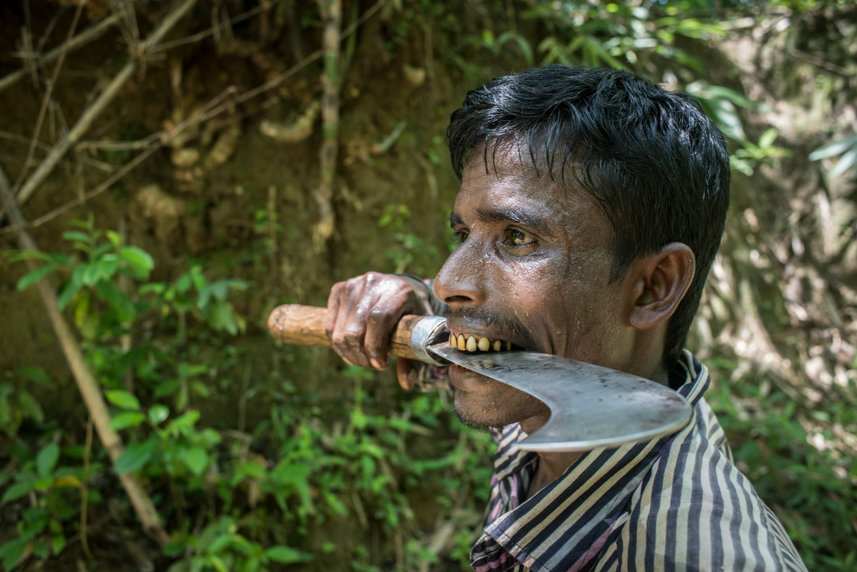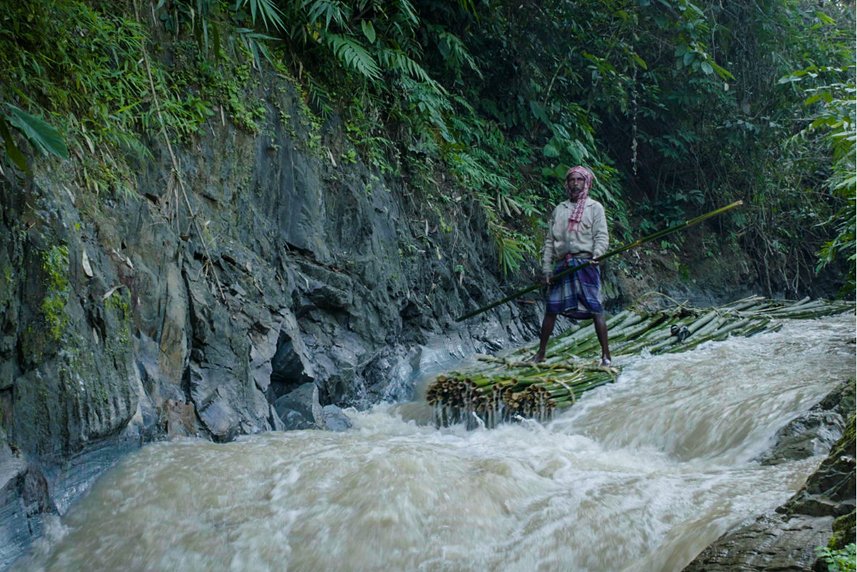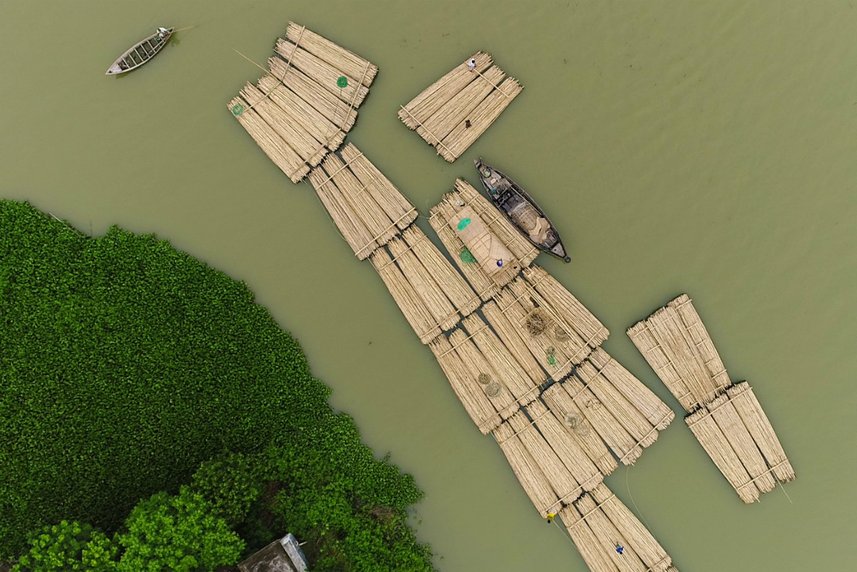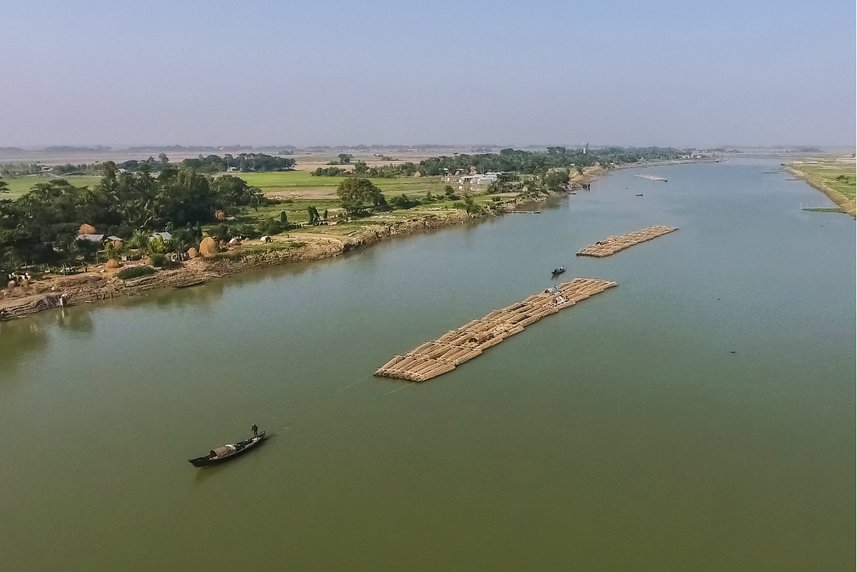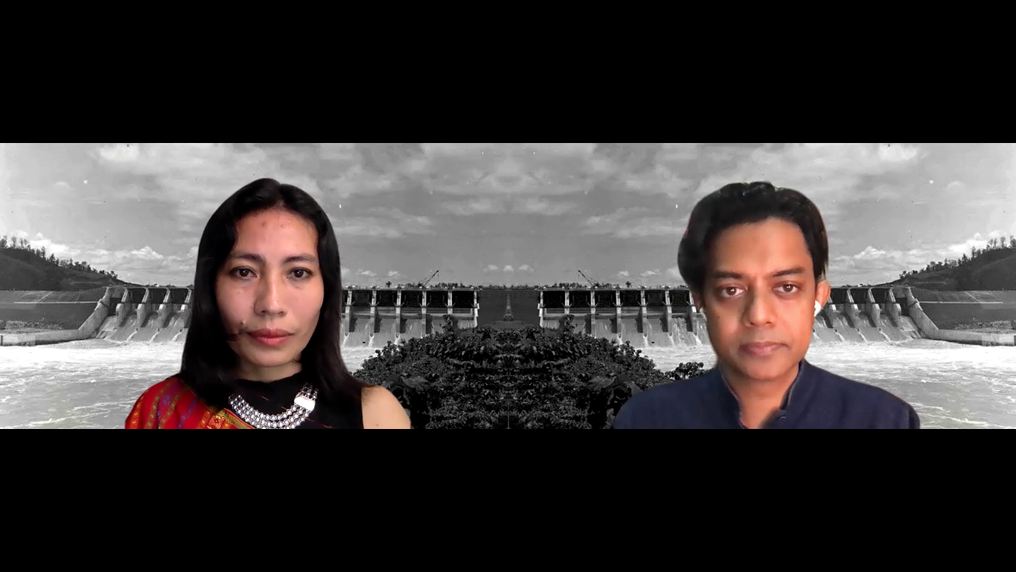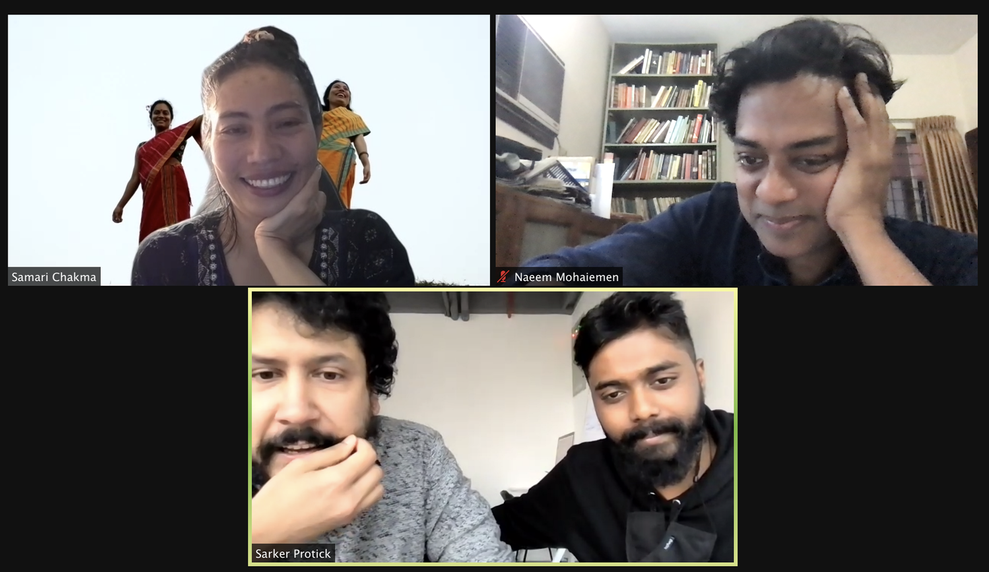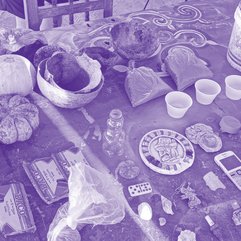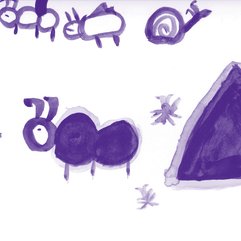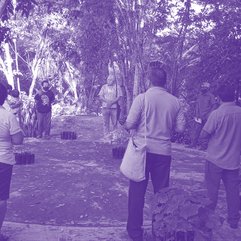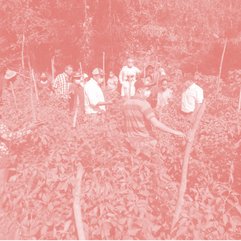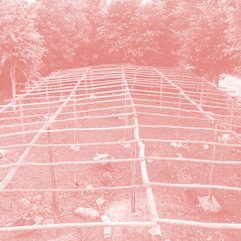Summer Lights Transitions II
Film Screenings and Guided Tours
10.00-20.00
Save the Date
all ages welcome
in German/in English

Summer Transitions introduces new works that keep transforming the already existing exhibitions XOOK K’IIN perceiving temporalities and U JUUM BÀALAM KAAB the humming of the guardian bee. Works by Maya artist José Chi Dzul and Warli artists Mayur and Tushar Vayeda, show some of the results of our ongoing collaborations, and open up new perspectives, knowledges, and forms of care.
Join us in the evening for the film screening of two stories revolving around two rivers of Bangladesh, and its deep relations and memories to the people. The screenings will be followed by a conversation with the filmmakers Naeem Mohaiemen, Samari Chakma and Shaheen Dill-Riaz.
Maya artist José Chi Dzul will contribute to the exhibition U JUUM XUNÁAN KAAB the humming of the guardian bee with a mural titled Conexión, that he is realizing on site. It is the outcome of a collaboration with poet Maria Elisa Chavarrea, who in her poem U juum Báalam Kaab, speaks about Melipona-culture in its connection to Maya language, and how their risk of extinction is intimately interconnected. In his painting, José Chi Dzul translates the imagery of words and sounds – playing also with the onomatopoeic elements of Maya language – into colors and geometric forms, using, as he says, “the most intimate part of nature” to visualize the complexity of the web of life we inhabit.
After a five day workshop in Berlin engaging a group of participants into the context, history, spirituality and technique of the Warli writing tradition, Mayur and Tushar Vayeda have also been working on a new piece as a contribution to the exhibition XOKK‘IIN perceiving temporalities. Therein they share their knowledge and experiences on reading signals in nature that are also part of the Warli tradition. On a movable floor-piece, they will narrate stories of rain predictions, such as the Kua birds singing (a type of bird that only appears before the monsoon), the positions of birds nests on trees, the migration of ants, the change of colors of frogs, all through a dialogue with Warli Shaman Shantaram Gurkhanal and farmer Suresh Burge, preservers of these knowledges in the community.
Program:
From 2 pm: exhibition tours led by children
From 4 pm: Screening of Bash Boibhob (Bamboo Stories) by Shaheen Dill-Riaz and Bor-Porong (Autobiography of the Drowned) by Samari Chakma und Naeem Mohaiemen and talk with the filmmakers
Bash Boibhob (Bamboo Stories) is a 96 mins documentary film written and directed by German/Bangladeshi filmmaker Shaheen Dill-Riaz. It follows the journey of a 70-metre raft made from bamboo stems (the cargo is the raft itself) as it makes a 300km journey from the forests of Sylhet, in North-Eastern Bangladesh, down the river Kushiyara. As the film follows the progress of the raft, the viewer learns the story behind the bamboo, from its felling the in forest to its being bundled and floated to the river via a series of man-made channels. Quietly the film opens a window into the lives of the people involved, telling their stories and those of their families through interviews and captured dialogue, thereby opening up a very personal experience of the river and its relation to human kind.
Samari Chakma and Naeem Mohaiemen’s work and Bor-Porong (Autobiography of the Drowned) is an oral history of the Chakma Adivasi (indigenous) people from Bangladesh, performed as an online dialogue between Samari Chakma, in Sydney, Australia, and Naeem Mohaiemen, in Dhaka. The work raises questions about how the modern borders of formerly colonized nations have recreated patterns of oppression that entrapped Indigenous and minority groups, resulting in dispossession, persecution, and displacement from ancestral homelands. Capturing the story of Samari Chakma’s mother specifically, the performance speaks to the struggles of those who lost their land after the government dammed the Karnaphuli River at Kaptai in the early 1960s, flooding villages and farms.
Shaheen Dill-Riaz is a filmmaker, director, producer and writer based in Berlin. Dill-Riaz spent most of his childhood in a small village on the coast of the Bay of Bengal until his parents sent him to a military academy. But drill and discipline could not extinguish his love for films. Having received a scholarship from the German Goethe-Institut, Shaheen Dill-Riaz moved to Berlin in the early 90s to study art history and theatrical science at the Freie Universität Berlin. He later enrolled at the University of Film & Television Konrad Wolf Potsdam-Babelsberg, where he graduated in cinematography with his feature-length film Sand and Water(2002). Dill-Riaz has been living in Berlin ever since, working as an independent filmmaker, director and writer in Europe and Asia. Dill-Riaz is also a Fellow at the “Cultural Foundations of Integration” Center of Excellence at the University of Konstanz, Germany, where he has been working as a guest-lecturer for the M.A. program “Studies in European Culture” in 2010 and 2012.
Naeem Mohaiemen makes films, installations and essays about socialist utopia, unstable borders, and fading family units. His essays include “Peace in Our Time? (Chittagong Hill Tracts 1715-1997)” (1997), “Connecting the Visible Dots: A Post- Accord history” (2010), “The Ginger Merchant of History: Standing in the shadow of ‘Giants’” (2016), “Muhammad Ali’s Bangladesh Passport: Unsteady Dreams of a Muslim International” (2016), and “Simulation at Wars’ End: A ‘Documentary’ in the Field of Evidence Quest” (2020). He is editor of Between Ashes and Hope: Chittagong Hill Tracts in the Blind Spot of Bangladesh Nationalism (Drishtipat 2010). In Bangladesh, his projects exhibited at Chobi Mela (2019, 2017, 2009), Bengal Foundation (2020), Abdur Razzaque Foundation (2017), Longitude Latitude (2016, 2013, 2011), Dhaka Art Summit (2014), Dhaka Art Centre (2012), Bishaud Bangla (2012), ULAB (2012), BRAC University (2012, 2004), and Gallery Chitrak (2008).
Samari Chakma was born in Khagrachari, Bangladesh. After her Masters in General History at Eden College, she received her LLB law degree from World University of Bangladesh and was certified as a lawyer in 2013. She was the first Chakma female lawyer enrolled to hear cases at the Bangladesh Supreme Court in 2017. Samari’s legal work is focused on providing legal assistance to rape victims, and victims of false cases, due to the ongoing political crisis of the Chittagong Hill Tracts. Samari was involved in the editing of two Hill Women’s Federation (HWF) publications – The Diary of Kalpana Chakma and Paharer Ruddho Kontho. In 2013 she founded, with comrades, the Comrade Rupak Chakma Memorial Trust, providing scholarships to 16 Pahari students. She is an editor at Thotkata.com and her writing has also been published in New Age, Survivable International, and Alal O Dulal. In 2018, she was a Bertha Global Exchange Fellow at the European Center for Constitutional and Human Rights, Berlin. Samari Chakma is currently in forced exile in Australia for her safety.



